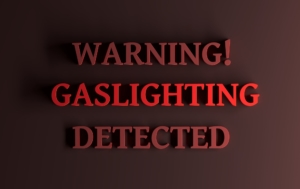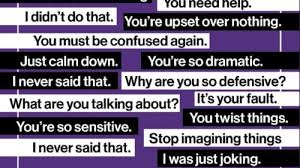
Gaslighting …
If you have spent much time on social media, chances are you have likely heard this term.
It has recently become very popular and, unfortunately, it is sometimes misused.
The term gaslighting comes from the 1940’s film “Gaslight”.
Gaslighting is more than just lying or attempting to deceive someone. It is much more devious and harmful. It is physiological abuse!
When a person lies for their gain and satisfaction – repeatedly and with so much confidence – the victim begins to doubt their sanity. The victim, now uncertain that they can perceive reality correctly, becomes dependent on the gaslighter.
This insidious kind of abuse is often difficult to detect. Since the abuser doesn’t leave any marks it is difficult for the victim to know it’s happening.
Signs of gaslighting
According to Robin Stern, Ph.D., author of the book “The Gaslight Effect: How to Spot and Survive the Hidden Manipulation Others Use to Control Your Life,” signs that you are a victim of gaslighting include:
- No longer feeling like the person you used to be.
- Being more anxious and less confident than you used to be.
- Often wondering if you’re being too sensitive
- Feeling like everything you do is wrong
- Always thinking it’s your fault when things go wrong.
- Apologizing – often!
- Having a sense that something’s wrong, but being unable to identify what it is.
- Often questioning whether your response to your partner is appropriate (e.g., wondering if you were too unreasonable or not loving enough).
- Making excuses for your partner’s behavior.
- Avoiding giving information to friends or family members to avoid confrontation about your partner.
- Feeling isolated from friends and family.
- Finding it increasingly hard to make decisions.
- Feeling hopeless and taking little or no pleasure in activities you used to enjoy.
Examples of Gaslighting

Abusers who gaslight become experts at “pushing your buttons”. They know all of your sensitivities and vulnerabilities and they use that knowledge against you thereby, making you doubt yourself, your judgment, your memory, and even your sanity.
Examples include:
- Minimizing your feelings: “There you go again, feeling sorry for yourself.”
- Telling you that people are talking behind your back: “Don’t you know your family hates you.” “Your friends are backstabbers.” “Everyone thinks you’re losing it.”
- Saying things to you that they later deny having said: “I didn’t say I’d mail that check! What are you talking about? Now we’ll get a late charge!”
- Hiding objects from you, and then deny knowing anything about it: “You seriously can’t find your keys again? I think something is wrong with you.”
- Insisting you were or were not at a certain place, even though it’s not true: “You never went to that restaurant with me. I would know! Maybe you dreamt it.”
- Using phrases like “You’re crazy” You’re going insane” “I think you’ve lost your mind” “You need serious help” “You need to see a doctor” “
So what to do.
Few things are as unsettling as realizing that you’re involved with an abusive person. Gaslighting, as with other forms of abuse, is rooted in the abuser’s desire to gain power and control over you. Gaslighting does this by making you doubt reality.
If you suspect you are experiencing gaslighting you need to:
- Recognize the pattern of undermining behavior. This step will help you to avoid arguing with a gaslighter, which will only agitate and escalate the situation. Gaslighting is only effective when you are not aware that it is going on. Once you recognize the pattern, it may not affect you as much. You may be able to shrug it off with a “Here we go again” attitude.
- Gaslighting isn’t about ‘what’s wrong with you’, rather it’s about an abuser gaining power and control over you.
- You cannot change the gaslighter. For an abuser to change they would need to willingly participate in intensive therapy.
- Rethink whether the relationship is worth putting up with the constant attempts to chip away at your self-esteem.
- Develop a support system, separate from the gaslighter. You need other people in your life who can confirm your reality and self-worth. This isn’t just family and friends. Doctors, therapists, and advocates can be part of your support system. It is important to include relationships that are separate from the abuser.
- Work on rebuilding your self-esteem. Remind yourself that you are a smart, loveable, and capable person. Starting a journal to record positive experiences and affirmations of your worth can assist you in building up your self-esteem.
- Get professional help. Victims often lose confidence in their thoughts and feelings and find themselves nervously double-checking themselves regularly. A therapist can offer you practical advice and support to help you recover. An advocate can help you find a therapist skilled in helping victims recover from abuse.
